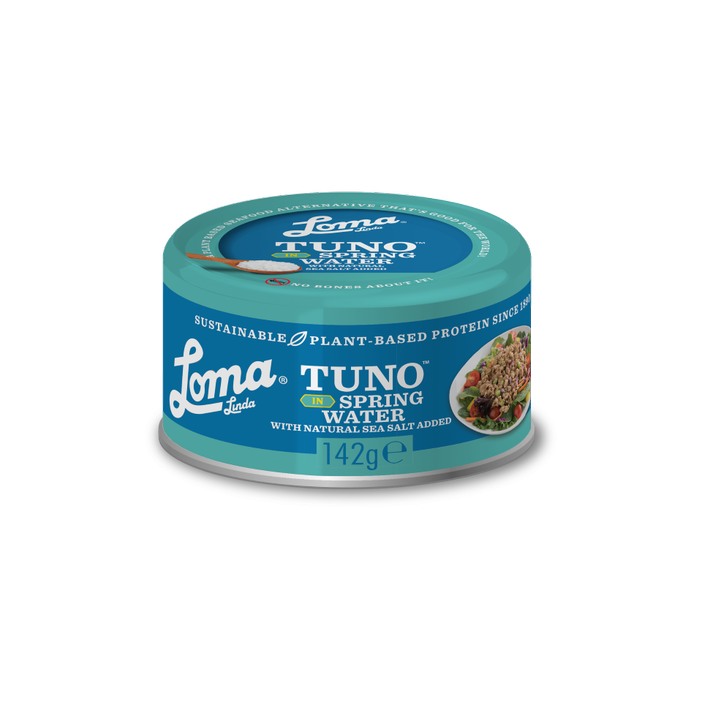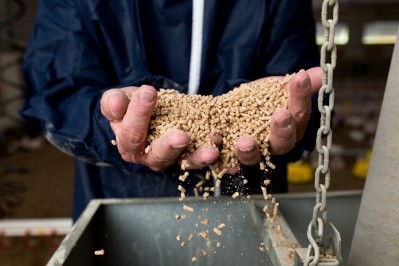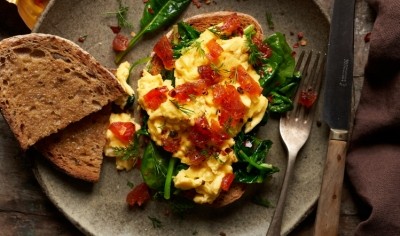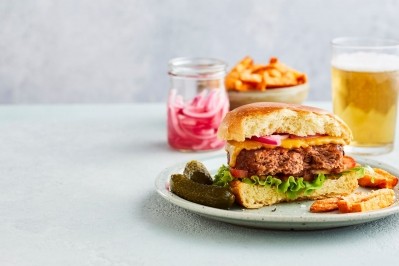Loma Linda Tuno: Plant-based tuna and the benefits of soy

With demand from consumers stronger than ever, huge opportunities to develop plant-based alternatives to animal products such as meat, cheese, eggs, fish and seafood have opened to manufacturers.
Already recognised as a 'hero ingredient' in plant-based food, soy is the most used plant-based protein for food formulations globally and in the UK. As well as a multitude of nutritional benefits with its complete protein source, essential amino acids, and low levels of saturated fat, something that draws producers to the product is its versatility.
Soy performs well in the manufacturing process, withstanding high cooking temperatures without breaking down. It is able to be moulded into new shapes, making it the go-to product for brands looking to create nuggets, chunks, strips and flake-like textures.
Loma Linda, one of the sponsors of Food Manufacture's virtual conference The Future of Plant-based Proteins: Roots of Further Growth, which aired on 31 March, is behind one of the UK’s first plant-based tuna alternative brands Tuno and range of ambient ready meals. It uses soy as a viable, nutritious protein source in all its products.
“The key challenges when creating plant-based food products is the taste and texture," said Eric Woods, managing director of Worldwide Foods Associates, the UK distributor for Loma Linda. "Especially when it comes to foods which have a distinct texture such as tuna, plant-based consumers favour a product which looks, tastes and feels as similar to the real thing as possible.
“Finding an ingredient that can meet these demands is the real challenge. During the development of Tuno we spent a considerable amount of time creating and testing different recipe options but in the end, soy was the perfect choice. It was the only product that allowed us to create the desired flaky tuna texture, flavour profile and with high protein levels.”
Exploring alternative plant-based options
Woods said although soy was well-loved among plant-based suppliers and consumers, the industry was constantly looking for new and innovative products that could become ‘the next soy’.
“From both a product development aspect, and a sustainability aspect, the team at Loma Linda are continually looking at alternative plant-based proteins.
“Although we think proteins from items such as peas and rice are becoming increasingly more available, it will be some time before anything overtakes the offering provided from soy. As well as developing the proteins to create the desired taste and texture, there are also other factors such as the nutritional benefit and whether it can be created using a sustainable supply chain.”
Food Manufacture held its virtual conference The Future of Plant-based Proteins: Roots of Further Growth on 31 March. Speakers and panellists included James Fisher, lead product developer, convenience meals, Marks & Spencer; Felippe Castillo, director of marketing and innovation at Tyson Foods and Karl Williams, group technical director, Meatless Farm.
Kerry Radicle, Roquette and Loma Linda Tuno sponsored the event, which is available on demand at £125+VAT per ticket. Supporters were Cargill, Firmenich, Ingredion, Mane and Symrise.
Will manufacturers continue to use soy in plant-based foods?
“Even if manufacturers can get other plant-based proteins to produce the same results as soy, developments in soy protein are regularly innovating vegan food. In terms of Tuno, we are continually reviewing new textures and flavours to further enhance the current product range.
“There is still plenty innovation potential to be had with soy and Loma Linda, like many others in the plant-based food industry, are regularly finding more ways of working with it as it remains a key ingredient.”
Loma Linda’s range of products, which include other protein-rich, convenient and affordable plant-based meals, have been brought to the UK by global health foods supplier Atlantic Natural Foods in partnership with WFA.
According to a Euromonitor report Going plant-based: the rise of vegan and vegetarian food, 7% of UK consumers in 2020 asserted they were following a vegetarian diet, the highest proportion of vegetarians in any country, followed by the US (5%).
Other key findings from the report include
- Consumers following strict vegan and vegetarian diets remain a small group of the population, whereas those restricting animal-based foods accounted for over 40% of global consumers in 2020.
- Along with Australia, UK has the largest proportion of consumers in any country to declare 'I have an animal -product eating restriction'. More than 45% responded positively to that statement in 2020, placing the UK above the worldwide average of 42%.
- In the UK, dairy-free goes hand in hand with vegan claims. This aligns with the fact that ethical reasons and animal welfare are key factors for UK consumers to choose plant-based offerings, and the vegan claim directly connects with these factors. By featuring both claims, brands can connect with a wider group of consumers. In other Western European countries, there is a clear dominance of vegan claims and there are potentially opportunities to embrace dairy-free claims or follow a mixed approach like in the UK.
- In meat substitutes, vegetarian claims lead in Western Europe, followed closely by vegan claims. Although some brands use both for the same product, some others include animal-based ingredients such as egg in their recipes, hence they are vegetarian but not vegan. Vegan and vegetarian claims connect with consumers from the ethical perspective in countries like the UK and Germany.
- Dairy-free ice cream and yoghurt have followed in the footsteps of milk alternatives. The US, the UK and Ireland are the countries with higher digital shares of shelf of both dairy-free and vegan claims in both these products (7.3% of stock keeping unit totals in the UK in 2019).
















